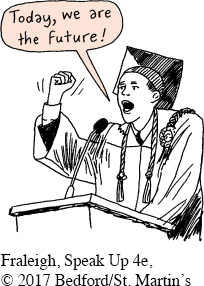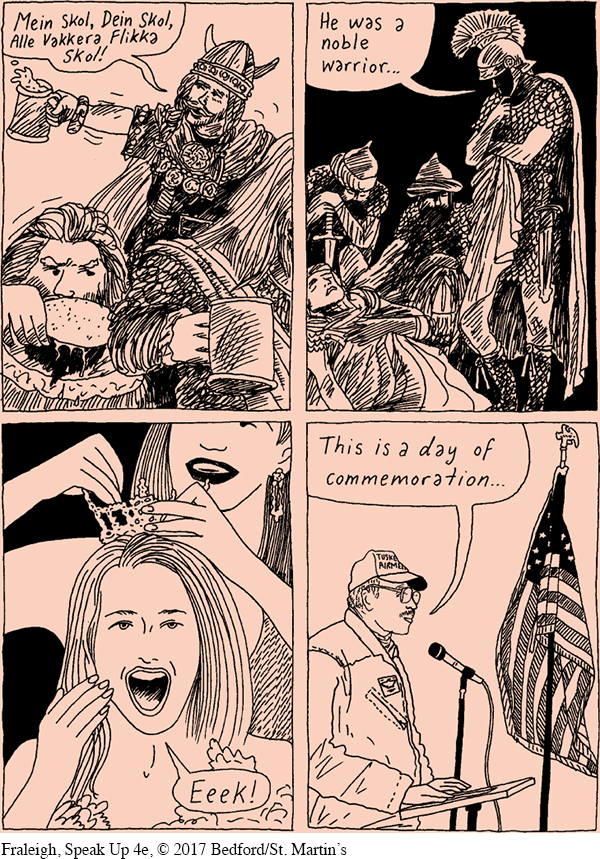Chapter 19 SPECIAL-OCCASION SPEAKING
Look for the  and
and  throughout the chapter for adaptive quizzing and online video activities.
throughout the chapter for adaptive quizzing and online video activities.
Page 577
“Whether to mark a celebration, a milestone, or a passing, we all participate in special-occasion speaking as speakers or listeners.”
Speeches that praise, celebrate, memorialize, or otherwise commemorate special occasions have a long history. A Sumerian tablet dating back to about 2000 BCE records the funeral utterances of Ludingirra, a teacher and poet, as he laments the loss of his father and his wife by eulogizing (or memorializing) their achievements and personal qualities. Indeed, epideictic rhetoric—speaking that praises or blames—was one of the three genres of oratory identified by the fourth-century BCE Greek philosopher Aristotle.1 Speakers typically used this form of address to celebrate timeless virtues during occasions such as funerals or holidays.2 And ever since Aristotle’s lifetime, people around the world have continued to use public speaking to help themselves and others celebrate joyous occasions, mourn the passing of loved ones, honor friends’ or colleagues’ achievements, and observe other milestones in their communities.
Page 578
Think about the times you’ve been moved by a speech marking a special occasion. Perhaps on a Labor Day, you heard a speaker praising workers who helped build some of the great bridges and highways in your area. Or maybe you’ve attended a gathering to observe the passing of another September 11 on the calendar, and the speaker’s words helped you reflect once again on the magnitude of the terrorist attacks in 2001. You also might have attended a wedding, clapping and cheering along with the other guests as friends and relatives of the bride and groom offered toasts to the new couple. And if you’ve excelled at your job, perhaps you’ve been presented with an award, along with words of praise from your boss, during a department meeting or party. If you’ve attended a formal dinner for your company or a community organization, you may have listened to an after-dinner speech—a traditional presentation designed to entertain an audience after a meal. Certainly, you’ll have the opportunity to listen to many speeches of congratulation and advice if you take part in graduation ceremonies after completing your college degree.

Special-occasion speeches mark some of the most important events in our lives—those that bring us together with others in our community and those that unite us in our humanity. As you go through life, you’ll hear many such speeches and probably will be called on to give one or more yourself. Even if you never have to deliver a formal presentation in an official capacity (such as at work or in a civic setting), you almost certainly will be invited to “say a few words” at various points in your life. For example, your grandmother might ask you to say good-bye to your deceased grandfather during an intimate graveside service. Or you might host a large gathering of family at your home for Thanksgiving, and your guests will expect you to start things off by sharing some inspiring words about the meaning of the holiday. Or perhaps you’ve arranged for your friend’s band to play for the first time at a local pub, and he asks you to introduce the performers to the crowd.
Whatever your special speaking occasion, you’ll have to face that ever-daunting question: “What am I going to say?” This chapter will help you answer that question. We start by introducing six types of special-occasion speeches and discussing the purposes each type serves. Next, we offer some general guidelines for speaking at a special occasion. After that, we go into detail about each of the six types of special-occasion speeches, providing tips tailored to each type. Finally, we revisit a few preparation and delivery strategies discussed earlier in the book.
Page 579

 and
and  throughout the chapter for adaptive quizzing and online video activities.
throughout the chapter for adaptive quizzing and online video activities.